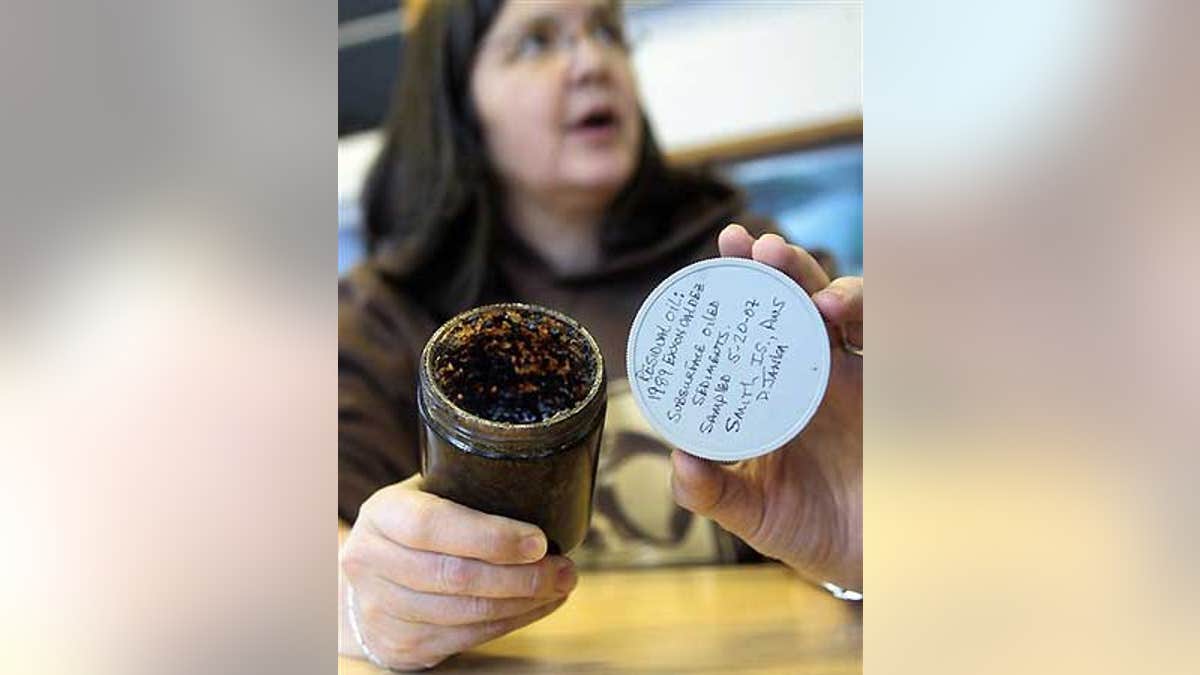
March 24: Nancy Bird shows oil-soaked soil collected in May 2007 from Smith Island in the Prince William Sound, on display at the Prince William Sound Science Center in Cordova, Alaska. On the 20th anniversary of the Exxon Valdez oil spill, she said "Scientists tell me the remaining oil will take de (AP)
ANCHORAGE, Alaska – For Steve Smith, the 20-year anniversary of the nation's worst oil spill is like a reminder that he lost a loved one.
"It's like a death in the family," the 70-year-old fisherman said of the Exxon Valdez disaster. "With time it gets a little better, but the pain never really goes away. Until this generation passes on, I don't think it will ever really be over."
Smith is among the scores of residents of Cordova and other communities whose lives were forever changed on March 24, 1989. That's when the tanker Exxon Valdez ran aground at Alaska's Bligh Reef, spewing 11 million gallons of crude into the rich fishing waters of the Prince William Sound. The legal and environmental repercussions are still felt today.
Cordova itself, 45 miles to the southeast, was not directly touched by the slick that soiled 1,200 miles of shoreline. But Smith and other residents say the spill was a staggering blow for a town so reliant on commercial fishing, particularly for herring, whose numbers plummeted several years after the spill and have yet to return.
"It was a tragic accident and one of the lowest points in our history," Exxon Mobil Corp. spokesman Alan Jeffers said Monday of the disaster.
An Anchorage jury awarded victims $5 billion in punitive damages in 1994, but that amount was cut in half by other courts on appeals by Exxon. Smith was planning his retirement with the $2.5 billion in punitive damages that Exxon was expected to pay the nearly 33,000 plaintiffs.
Then last June, the U.S. Supreme Court decided to cut the punitive damages to $507.5 million. That translates to an average of $15,000 per victim. Scores of plaintiffs are still waiting to be paid their share and still unresolved is whether Exxon Mobil should have to pay interest, which would add an estimated $488 million if calculated since 1994.
It's not surprising then, that many Cordova fishermen won't be among those attending a host of events and presentations in Alaska and outside the state commemorating the spill 20 years later. No events are planned by the Cordova District Fishermen United, which represents the commercial fishing fleet in the town of 2,200.
"It's hard to keep dwelling on this thing that has caused so much pain in this community," said executive director Rochelle van den Broek. "The term 'anniversary' kind of offends a lot of fishermen. The term implies celebration and there's nothing to celebrate."
The spill killed hundreds of thousands of birds and other marine animals, inflicting environmental injuries that have not fully recovered, according to numerous scientific studies.
Exxon Mobil countered that many studies have found the area healthy and thriving. The Irving, Texas-based company had said punitive damages would be excessive punishment on top of the $3.4 billion in cleanup costs, compensatory payments and fines it already has paid.
Exxon maintained it should not be liable for the actions of the supertanker's skipper, Joseph Hazelwood, when the nearly 1,000-foot vessel ran aground with 53 millions gallons of oil in its hold.
According to prosecutors, Hazelwood was drunk, but he denied it and was acquitted of the charge in criminal court. Plaintiffs say Exxon knew Hazelwood had begun drinking again after seeking treatment, but the company still put him at the helm.
Hazelwood apologized to Alaskans in the recently released book, "The Spill, Personal Stories from the Exxon Valdez Disaster."
"Occasionally people have called me a scapegoat, but I've never felt comfortable with that term when applied to me in regard to the oil spill," he says. "I was captain of a ship that ran aground and caused a horrendous amount of damage. I've got to be responsible for that. There's no way around it."
Outwardly, the sound's stunning beauty has been restored, its network of islands, fjords and glaciers offering breathtaking views. But residents in Cordova and other communities say the area is still far from recovered. It took years for salmon numbers to rebound, and sea otters and Harlequin ducks are still below pre-spill numbers there.
An estimated 21,000 gallons of crude linger, researchers say. Jars of oil-stained sand and rocks still being dug up in the spill area can be examined at the Prince William Sound Science Center in Cordova.
"Scientists tell me the remaining oil will take decades and possibly centuries to disappear," said Nancy Bird, president of the science center.
Jeffers, the Exxon spokesman, said the spill led to significant reforms, including improved technologies and a new management system. For example it has instituted drug and alcohol testing for safety sensitive positions, jobs that cannot be held by those with substance abuse histories.
"We learned from this tragedy and went about developing a system to prevent this from ever happening again," Jeffers said.
